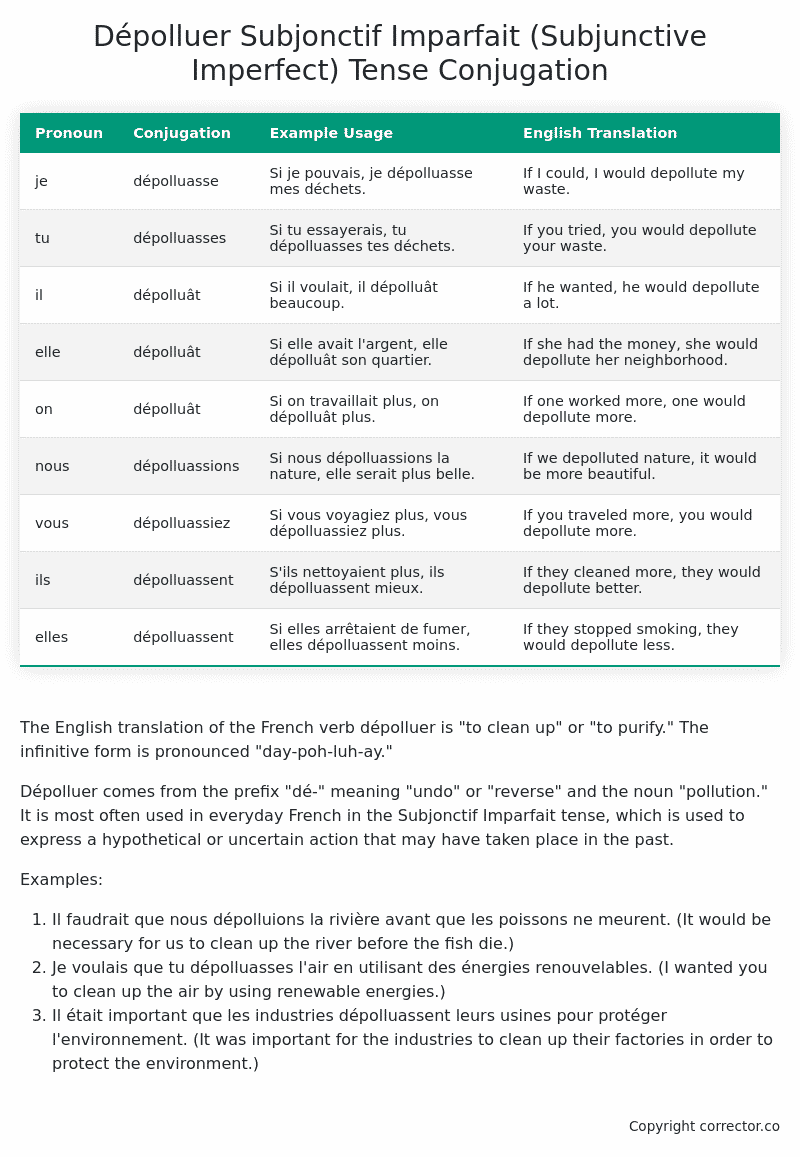Subjonctif Imparfait (Subjunctive Imperfect) Tense Conjugation of the French Verb dépolluer
Introduction to the verb dépolluer
The English translation of the French verb dépolluer is “to clean up” or “to purify.” The infinitive form is pronounced “day-poh-luh-ay.”
Dépolluer comes from the prefix “dé-” meaning “undo” or “reverse” and the noun “pollution.” It is most often used in everyday French in the Subjonctif Imparfait tense, which is used to express a hypothetical or uncertain action that may have taken place in the past.
Examples:
- Il faudrait que nous dépolluions la rivière avant que les poissons ne meurent. (It would be necessary for us to clean up the river before the fish die.)
- Je voulais que tu dépolluasses l’air en utilisant des énergies renouvelables. (I wanted you to clean up the air by using renewable energies.)
- Il était important que les industries dépolluassent leurs usines pour protéger l’environnement. (It was important for the industries to clean up their factories in order to protect the environment.)
Table of the Subjonctif Imparfait (Subjunctive Imperfect) Tense Conjugation of dépolluer
| Pronoun | Conjugation | Example Usage | English Translation |
|---|---|---|---|
| je | dépolluasse | Si je pouvais, je dépolluasse mes déchets. | If I could, I would depollute my waste. |
| tu | dépolluasses | Si tu essayerais, tu dépolluasses tes déchets. | If you tried, you would depollute your waste. |
| il | dépolluât | Si il voulait, il dépolluât beaucoup. | If he wanted, he would depollute a lot. |
| elle | dépolluât | Si elle avait l’argent, elle dépolluât son quartier. | If she had the money, she would depollute her neighborhood. |
| on | dépolluât | Si on travaillait plus, on dépolluât plus. | If one worked more, one would depollute more. |
| nous | dépolluassions | Si nous dépolluassions la nature, elle serait plus belle. | If we depolluted nature, it would be more beautiful. |
| vous | dépolluassiez | Si vous voyagiez plus, vous dépolluassiez plus. | If you traveled more, you would depollute more. |
| ils | dépolluassent | S’ils nettoyaient plus, ils dépolluassent mieux. | If they cleaned more, they would depollute better. |
| elles | dépolluassent | Si elles arrêtaient de fumer, elles dépolluassent moins. | If they stopped smoking, they would depollute less. |
Other Conjugations for Dépolluer.
Le Present (Present Tense) Conjugation of the French Verb dépolluer
Imparfait (Imperfect) Tense Conjugation of the French Verb dépolluer
Passé Simple (Simple Past) Tense Conjugation of the French Verb dépolluer
Passé Composé (Present Perfect) Tense Conjugation of the French Verb dépolluer
Futur Simple (Simple Future) Tense Conjugation of the French Verb dépolluer
Futur Proche (Near Future) Tense Conjugation of the French Verb dépolluer
Plus-que-parfait (Pluperfect) Tense Conjugation of the French Verb dépolluer
Passé Antérieur (Past Anterior) Tense Conjugation of the French Verb dépolluer
Futur Antérieur (Future Anterior) Tense Conjugation of the French Verb dépolluer
Subjonctif Présent (Subjunctive Present) Tense Conjugation of the French Verb dépolluer
Subjonctif Passé (Subjunctive Past) Tense Conjugation of the French Verb dépolluer
Subjonctif Imparfait (Subjunctive Imperfect) Tense Conjugation of the French Verb dépolluer (this article)
Subjonctif Plus-que-parfait (Subjunctive Pluperfect) Tense Conjugation of the French Verb dépolluer
Conditionnel Présent (Conditional Present) Tense Conjugation of the French Verb dépolluer
Conditionnel Passé (Conditional Past) Tense Conjugation of the French Verb dépolluer
L’impératif Présent (Imperative Present) Tense Conjugation of the French Verb dépolluer
L’infinitif Présent (Infinitive Present) Tense Conjugation of the French Verb dépolluer
Struggling with French verbs or the language in general? Why not use our free French Grammar Checker – no registration required!
Get a FREE Download Study Sheet of this Conjugation 🔥
Simply right click the image below, click “save image” and get your free reference for the dépolluer Subjonctif Imparfait tense conjugation!

Dépolluer – About the French Subjonctif Imparfait (Subjunctive Imperfect) Tense
Formation
Common Everyday Usage Patterns
Interactions with Other Tenses
Subjonctif Présent
Indicatif Passé Composé
Conditional
Conditional Perfect
Summary
I hope you enjoyed this article on the verb dépolluer. Still in a learning mood? Check out another TOTALLY random French verb conjugation!


